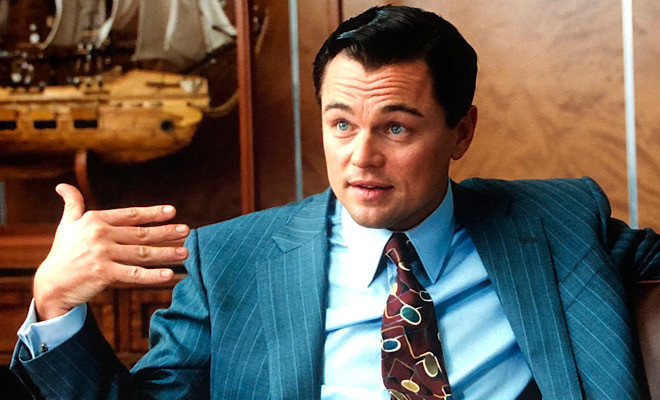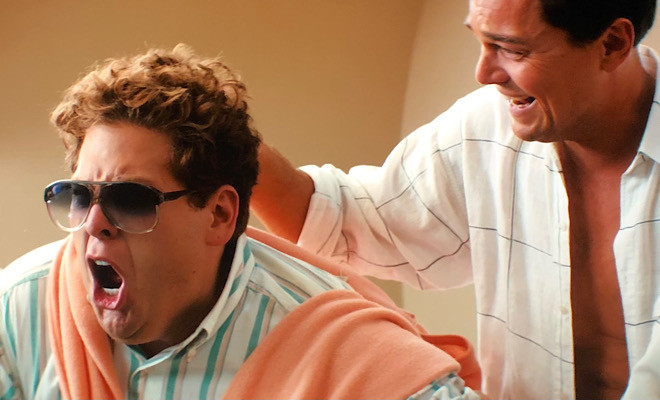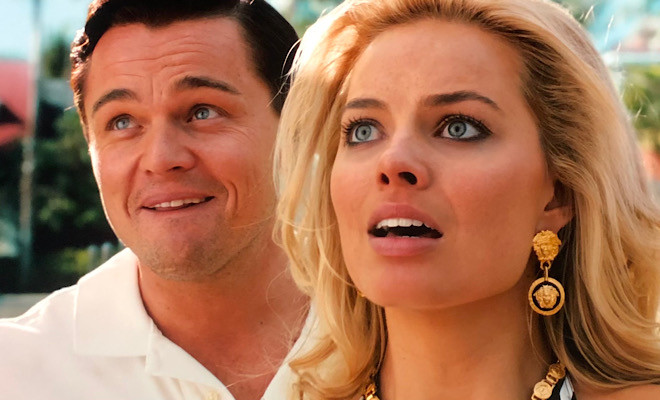Martin Scorsese’s name is synonymous with Mafia masterpieces. Films like Mean Streets, GoodFellas, Casino, The Departed, and The Irishman have offered audiences an unflinching look into the brutal world of organized crime. Yet, while seemingly a departure, The Wolf of Wall Street roars with a similar intensity, albeit in the sharply tailored suits of Wall Street wolves rather than the dimly lit backrooms of mobsters. This Scorsese epic, now available in stunning 4K, explores a realm where greed is the ultimate religion, and power is measured in dollar bills, not bullets. It’s a world that, in its own twisted way, mirrors the lawless underworld Scorsese has so masterfully depicted throughout his career.
In this high-stakes jungle, stockbrokers are the predators, feasting on the naivety of ordinary investors. The film plunges us into the era of 1980s excess, a time when boundaries were blurred and morality was a negotiable commodity. For the Wall Street elite, indulgence was the mantra, fueled by an insatiable hunger for sex, drugs, and mountains of cash. Jordan Belfort, a young hustler who began his career in 1987 at just 25, became the embodiment of this outrageous era.
Belfort’s life, a spectacular train wreck of ambition and avarice, is as captivating as the true-crime sagas of Henry Hill in GoodFellas. The Wolf of Wall Street, adapted by Terence Winter from Belfort’s scandalous memoir, presents this “truth” through the eyes of its protagonist – an arrogant, self-serving character cut from the same cloth as Gordon Gekko. Belfort, with his intoxicating charm, manipulates both his clients and the audience, drawing us into his world of penny stocks and illicit riches. His firm, built on defrauding countless investors, funded an unbelievably opulent lifestyle that ultimately crumbled under the weight of federal investigations. Scorsese mirrors Belfort’s excess with a film that is equally unrestrained and over-the-top. It’s a wickedly funny, yet deeply unsettling black comedy that grabs you from the first scene and doesn’t let go for a dizzying three hours, plunging you into the darkest corners of human desire. While some critics found it offensive, its brilliance is undeniable.
 Leonardo DiCaprio in The Wolf of Wall Street, portraying Jordan Belfort with intensity and charisma.
Leonardo DiCaprio in The Wolf of Wall Street, portraying Jordan Belfort with intensity and charisma.
Scorsese’s brilliance lies in his intimate understanding of this world and his ability to capture its inherent absurdity. The Wolf of Wall Street functions as both a nostalgic celebration and a sharp satire of its subject. The film hilariously skewers the excesses of Wall Street culture – the hedonistic parties, the hyper-masculine ethos, the cult-like devotion to wealth, and the rampant debauchery – all while delivering a serious indictment of its destructive and unethical core. It’s a sprawling, riotous, and often revolting spectacle, filled with unforgettable dialogue and dazzling cinematic style. Like a runaway train, the film barrels forward, mirroring the relentless pace of the era, taking no prisoners in its wake. Wall Street in the ’80s and ’90s was a world of exaggeration, and Scorsese embraces this exaggeration to tell Belfort’s story. While cruder and more overtly comedic than GoodFellas, it retains that same sense of awe, immersing us in a culture that most have only glimpsed from afar. This vicarious thrill ride is exhilarating for those who understand the film’s satirical context.
Leonardo DiCaprio’s Jordan Belfort is a “lower than pond scum” nobody who transforms into a financial superman. He ascends the ranks with cunning and audacity, playing by his own rules to manipulate the system. He cultivates a fanatical following, building a powerful empire where the pursuit of wealth eclipses all else, including morality. Jordan is presented as an everyman corrupted by opportunity and ambition. He didn’t necessarily set out to become a guru of greed, but the circumstances and his own insatiable drive created the perfect storm. Watching his meteoric rise and spectacular fall, especially as rendered by Scorsese, is undeniably captivating.
 Leonardo DiCaprio and Jonah Hill in The Wolf of Wall Street, depicting the extravagant and often illegal activities of stockbrokers.
Leonardo DiCaprio and Jonah Hill in The Wolf of Wall Street, depicting the extravagant and often illegal activities of stockbrokers.
The film’s explicit content – its barrage of profanity, drug use, nudity, and morally questionable behavior – has been widely discussed. However, to sanitize Belfort’s story would be to betray its very essence. Scorsese, with almost gleeful abandon, plunges the audience into a world most can scarcely imagine. Similar to his gangster films, he makes this counter-culture both fascinating and disturbingly alluring. Belfort embodies the American Dream on steroids, representing both the allure and the corruption at the heart of American ambition. While the film doesn’t condone his actions, it revels in the spectacle of his larcenous magic, only to ultimately deliver the satisfying crash of his downfall. In the tradition of classic gangster films like Little Caesar and The Public Enemy, The Wolf of Wall Street charts the rise and fall of a larger-than-life figure, serving as both a morality tale and a cautionary warning. Yet, unlike those earlier gangster dramas, this film doesn’t take itself too seriously, even as it tackles serious themes.
DiCaprio’s portrayal of Jordan Belfort is nothing short of masterful, deserving of the Best Actor Oscar that eluded him that year. He embodies the greedy, lustful, and egomaniacal Belfort with impeccable precision and natural charisma, making this reprehensible character strangely likeable. Without resorting to typical award-baiting theatrics, DiCaprio disappears into the role, delivering a passionate, full-throttle performance that showcases his immense talent.
 Leonardo DiCaprio and Margot Robbie in The Wolf of Wall Street, highlighting the glamorous and excessive lifestyle depicted in the film.
Leonardo DiCaprio and Margot Robbie in The Wolf of Wall Street, highlighting the glamorous and excessive lifestyle depicted in the film.
While Matthew McConaughey won Best Actor that year, his brief but memorable role in The Wolf of Wall Street might have contributed to his victory. As Belfort’s eccentric mentor, McConaughey delivers an unforgettable performance, advising the young Jordan to embrace drugs and self-gratification to succeed. Jonah Hill is equally brilliant as Belfort’s equally voracious right-hand man, and Margot Robbie shines as Jordan’s fiery wife. The supporting cast, including Kyle Chandler, Rob Reiner, and Jon Favreau, also deliver strong performances.
The Wolf of Wall Street marks the fifth collaboration between Scorsese and DiCaprio, arguably their finest to date. It’s a perfect synergy of director and project, actor and role. They push each other to new heights, creating a film that is both controversial and undeniably artistic. The Wolf of Wall Street is a film that polarizes – you’ll either love it or loathe it. Regardless of your opinion, its artistic merit and DiCaprio’s career-defining performance are undeniable, especially when experienced in the enhanced visual fidelity of 4K UHD. This isn’t just a movie; it’s a masterwork by a cinematic legend, showcasing arguably the best performance from one of the greatest actors of our generation, now sharper and more immersive than ever in 4K.
Vital Disc Stats: The Ultra-HD Blu-ray
The Wolf of Wall Street on 4K UHD arrives in standard packaging with a sleeve and a digital copy code. The video codec is 2160p/HEVC H.265 with Dolby Vision, and audio is DTS-HD Master Audio 5.1. The disc menu is full-motion and musical, launching immediately upon insertion. No previews precede the main menu. Experience the depravity and hilarity in stunning detail with this 4K release.
